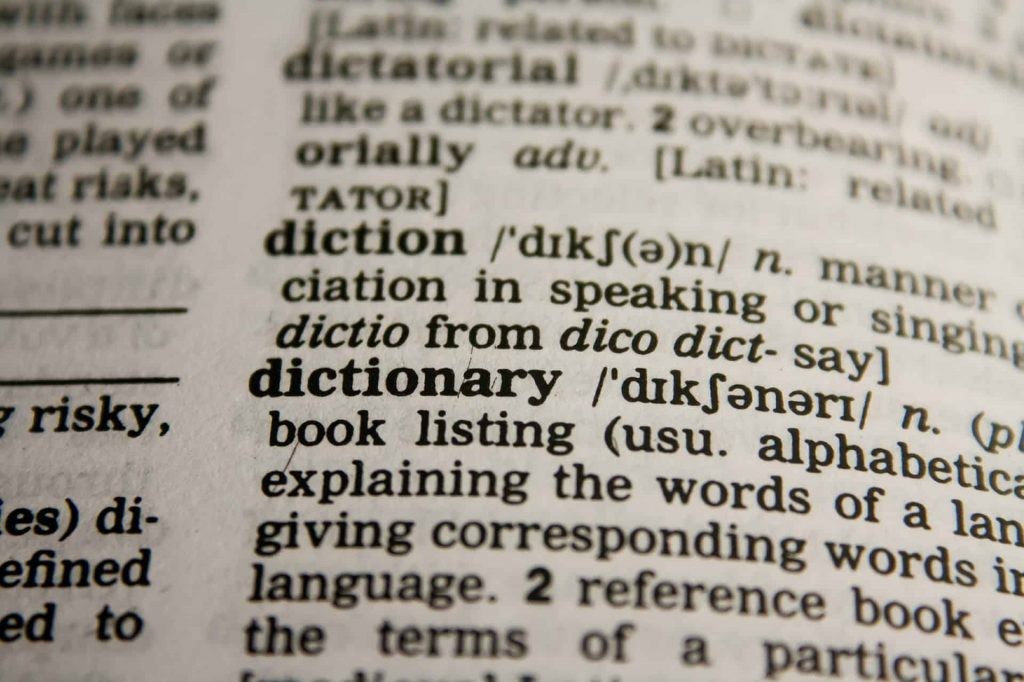Vocabulary is indeed a cornerstone of language acquisition, serving as the fundamental building block for effective communication and faster fluency. At LEARNS.EDU.VN, we understand the vital role that vocabulary plays in mastering a new language. This article explores the multifaceted importance of vocabulary in language learning and provides actionable strategies to enhance your vocabulary acquisition journey.
1. Vocabulary: The Bedrock of Language
Vocabulary is the essence of language, forming the basis for expressing thoughts, sharing information, understanding others, and nurturing relationships. Even with limited knowledge of grammar, basic communication is possible through vocabulary.
For instance, ordering a “pain au chocolat” in a French bakery with a smile can be as effective as a grammatically perfect sentence. While both are ideal, vocabulary is essential.
According to British linguist David A. Wilkins, “without grammar, very little can be conveyed; without vocabulary nothing can be conveyed.”
Children’s language acquisition supports this. They begin with single words like “duck” or “ball” to communicate their needs before attempting complex structures. While communication becomes more effective as their language skills develop, vocabulary enables initial interaction.
2. How Does a Rich Vocabulary Enhance Language Skills?
A broad vocabulary significantly enhances the four core language skills: reading, writing, listening, and speaking. Paul Nation noted that “Vocabulary is not an end in itself. A rich vocabulary makes the skills of listening, speaking, reading, and writing easier to perform.”
2.1. Reading Comprehension
Vocabulary knowledge is crucial for reading comprehension, for both native speakers and learners. Understanding the words used in a text is essential for grasping its meaning. Without adequate vocabulary, readers may struggle, resort to dictionaries, guess meanings, or give up altogether.
This connection has been extensively studied. A 2010 study revealed that vocabulary size accounted for 64% of variance in reading scores.
2.2. Listening Proficiency
Similar to reading, listening skills depend on vocabulary. Recognizing and decoding sounds to extract meaning is challenging when unfamiliar with the vocabulary. Advanced learners might infer meaning from context or word families, but this can be difficult.
While not the only factor, vocabulary knowledge is an important component of listening comprehension.
2.3. Speaking Fluency
Native speakers sometimes experience the frustration of a word being “on the tip of the tongue.” This is comparable to a language learner lacking specific vocabulary. Without the necessary words, expressing a message fully becomes impossible.
Vocabulary is a critical element in speaking a foreign language. In a 2013 paper, Rie Koizumi stated that “…out of five factors (i.e., accent, comprehension, fluency, grammar, and vocabulary), vocabulary was the only one that affected level differences between learners at novice and intermediate levels. For learners at intermediate levels and above, all the five factors affected level differences, but vocabulary frequently appeared as the discriminatory factor.”
2.4. Writing Expression
A larger vocabulary allows for more precise and expressive writing. Having a wider selection of words enables you to convey thoughts, feelings, events, and ideas with greater accuracy.
Lars Stenius Stæhr stated that “Learners’ receptive vocabulary size was found to be strongly associated with their reading and writing abilities…” in the 2008 study, ‘Vocabulary Size and the Skills of Listening, Reading and Writing. Language Learning Journal’.
3. Vocabulary as a Catalyst for Enhanced Fluency
Knowing more vocabulary enhances language skills, allowing access to a wider range of learning materials. Contextual understanding further expands vocabulary without constant dictionary use.
Understanding vocabulary also facilitates deciphering new words by breaking them into morphemes, such as the prefix “un-” in “unhappy.” Recognizing “un-” as a derivational morpheme that inverts meaning allows learners to infer the meaning of “unhappy.”
This saves time, boosts confidence, and supports fluency, encouraging learners to tackle complex texts and social situations, further expanding their vocabulary.
Without a strong foundation in vocabulary, this progress is hindered.
4. How is a Strong Vocabulary Linked to Academic Success?
Many learners study English to attend English-speaking universities, excel in higher education, and secure well-paying jobs. A strong vocabulary can help them achieve these goals.
A wide vocabulary correlates with better performance in all aspects of language learning, benefiting both native speakers and learners. Encouraging children to read extensively expands their vocabulary, improving their academic performance. The same applies to foreign language learners.
A recent study titled ‘Investigating the Relationship between Vocabulary Knowledge and Academic Success of Arabic Undergraduate Learners in Swansea University,’ highlighted that “[The findings illuminate] the importance of vocabulary knowledge, not just as a predictor of academic achievement but also as a predictor of both intelligence and foreign language aptitude.”
A student’s vocabulary reflects their knowledge and willingness to learn. The more terms and expressions acquired, the easier it is to succeed in their field.
5. How to Effectively Expand Your Vocabulary?
Expanding your vocabulary is a continuous process. Here are effective methods to achieve this:
| Method | Description | Benefits |
|---|---|---|
| Reading Extensively | Read books, articles, and other materials in your target language. Pay attention to unfamiliar words and try to understand them from context. | Exposure to new words in context, improved comprehension, enhanced retention. |
| Using Flashcards | Create flashcards with new words and their definitions. Review them regularly to reinforce your memory. | Active recall, spaced repetition, efficient memorization. |
| Learning Word Roots | Understand common prefixes, suffixes, and root words. This will help you decipher the meaning of new words more easily. | Improved ability to guess meanings, expanded vocabulary, deeper understanding of language structure. |
| Utilizing Vocabulary Apps | Use language learning apps like Memrise, Anki, or Quizlet to learn and practice new words. | Gamified learning, personalized practice, convenient access. |
| Engaging in Conversations | Practice using new words in conversations with native speakers or other language learners. | Practical application, improved fluency, enhanced recall. |
| Watching Movies & TV Shows | Watch movies and TV shows in your target language with subtitles. Pay attention to the vocabulary used and try to understand it from context. | Exposure to authentic language, improved listening comprehension, enhanced cultural understanding. |
| Keeping a Vocabulary Journal | Write down new words and their definitions in a journal. Review the journal regularly to reinforce your memory. | Active learning, personalized record, enhanced retention. |
| Playing Word Games | Play word games like Scrabble, Boggle, or crossword puzzles in your target language. | Fun and engaging learning, improved vocabulary, enhanced strategic thinking. |
| Setting Vocabulary Goals | Set specific, measurable, achievable, relevant, and time-bound (SMART) goals for vocabulary learning. | Increased motivation, focused learning, trackable progress. |
| Using a Thesaurus | Use a thesaurus to find synonyms and antonyms for new words. This will help you expand your vocabulary and understand the nuances of different words. | Expanded vocabulary, improved writing, enhanced understanding of language. |
| Immersing Yourself | Surround yourself with the language as much as possible. Listen to music, podcasts, and radio in your target language. | Constant exposure, improved comprehension, enhanced cultural understanding. |
| Joining Language Communities | Connect with other language learners and native speakers online or in person. Share resources, ask questions, and practice your language skills together. | Collaborative learning, mutual support, enhanced motivation. |




6. Text Inspector’s Focus on Vocabulary
Understanding the connection between vocabulary and language proficiency, Text Inspector focuses on vocabulary to enhance English language teaching. A vocabulary analysis tool provides insights into vocabulary frequency, complexity, and CEFR level.
This helps teachers and curriculum developers create effective learning materials and improve understanding of the English language.
7. Leveraging LEARNS.EDU.VN for Vocabulary Enrichment
LEARNS.EDU.VN offers a variety of resources to help you enrich your vocabulary and improve your language skills.
- Extensive Article Library: Access a wide range of articles on various topics to encounter new words in context.
- Vocabulary Lists: Explore curated vocabulary lists tailored to different proficiency levels and subjects.
- Interactive Quizzes: Test your vocabulary knowledge with engaging quizzes and receive instant feedback.
- Expert Guidance: Benefit from expert guidance and tips on effective vocabulary learning strategies.
- Community Support: Connect with fellow learners and share your vocabulary learning journey.
8. Common Challenges in Vocabulary Acquisition and How to Overcome Them
| Challenge | Solution |
|---|---|
| Memorizing New Words | Use spaced repetition techniques, flashcards, and mnemonic devices. |
| Understanding Contextual Meaning | Read extensively, pay attention to surrounding words, and use context clues to infer meaning. |
| Pronunciation Difficulties | Use online dictionaries with audio pronunciations, practice speaking with native speakers, and record yourself to identify areas for improvement. |
| Distinguishing Similar Words | Use a thesaurus to understand nuances, study example sentences, and practice using the words in different contexts. |
| Maintaining Motivation | Set realistic goals, track your progress, reward yourself for achievements, and find a language learning partner to stay accountable. |
| Difficulty Applying in Conversation | Practice speaking with native speakers, join language exchange groups, and create opportunities to use new words in real-life situations. |
| Overwhelm from Sheer Volume | Prioritize learning high-frequency words first, focus on vocabulary related to your interests, and break down learning into smaller, manageable chunks. |
| Lack of Exposure | Immerse yourself in the language through reading, listening, and watching media. Create a language-rich environment by labeling objects and changing your phone language. |
9. Advanced Techniques for Vocabulary Mastery
- Thematic Vocabulary Learning: Group words by topic (e.g., food, travel, technology) to create meaningful associations.
- Collocation Study: Learn which words commonly go together (e.g., “make a mistake,” “heavy rain”) to improve fluency.
- Morphological Analysis: Break down words into prefixes, suffixes, and roots to understand their structure and meaning.
- Idiom and Expression Acquisition: Study common idioms and expressions to add color and authenticity to your language.
- Vocabulary Notebook: Keep a dedicated notebook for new words, example sentences, and personal notes.
- Spaced Repetition Systems (SRS): Use SRS software or apps to optimize vocabulary review and retention.
10. Vocabulary and Cultural Understanding
Vocabulary is not just about knowing words; it’s also about understanding the cultural context in which they are used. Learning vocabulary related to customs, traditions, and social norms can help you communicate more effectively and appropriately.
For example, understanding cultural references in idioms and expressions can deepen your comprehension and appreciation of the language.
11. The Role of Technology in Vocabulary Learning
Technology has revolutionized vocabulary learning, providing access to a wide range of tools and resources.
- Online Dictionaries: Instant access to definitions, pronunciations, and example sentences.
- Language Learning Apps: Gamified learning, personalized practice, and progress tracking.
- Vocabulary Builders: Tools that help you create and manage your own vocabulary lists.
- AI-Powered Tutors: Personalized feedback and guidance on vocabulary usage.
- Online Language Communities: Opportunities to connect with other learners and native speakers.
12. Vocabulary and Professional Development
In today’s globalized world, a strong vocabulary can be a significant asset in professional development. Whether you are seeking a new job, aiming for a promotion, or expanding your business internationally, vocabulary skills can enhance your communication and credibility.
Specific vocabulary related to your industry or field can also demonstrate your expertise and professionalism.
13. What Is the Importance of Vocabulary in Language Learning?
Vocabulary underpins all other language skills, acting as a stepping stone to high-level language use and faster fluency.
However, other factors influence language ability. ESL teachers and students should dedicate time to developing vocabulary.
Is vocabulary important?
We value your feedback! Share your thoughts with us at LEARNS.EDU.VN.
LEARNS.EDU.VN is located at 123 Education Way, Learnville, CA 90210, United States. You can also contact us via Whatsapp at +1 555-555-1212 or visit our website at LEARNS.EDU.VN.
Discover more valuable insights and resources for language learning on our website. Visit learns.edu.vn today to explore our comprehensive courses and unlock your full learning potential!
FAQ: Vocabulary in Language Learning
1. Why is vocabulary so important in language learning?
Vocabulary forms the foundation of all language skills. Without a solid vocabulary base, it’s difficult to read, write, listen, or speak effectively.
2. How many words do I need to know to be fluent in a language?
While there’s no magic number, knowing around 3,000-5,000 words can enable you to understand most everyday conversations and written texts.
3. What’s the best way to learn new vocabulary?
Combine active learning techniques like flashcards and spaced repetition with passive exposure through reading and listening.
4. How can I improve my vocabulary for academic purposes?
Focus on learning academic vocabulary lists and reading scholarly articles and books in your field.
5. Should I focus on learning individual words or phrases?
Both are important. Learning phrases and collocations can help you use words in context and improve fluency.
6. How can I stay motivated to learn new vocabulary?
Set realistic goals, track your progress, reward yourself, and find a language learning partner.
7. Are there any specific vocabulary learning techniques that are particularly effective?
Spaced repetition, mnemonic devices, and thematic vocabulary learning have been shown to be highly effective.
8. How can I use technology to enhance my vocabulary learning?
Utilize online dictionaries, language learning apps, and vocabulary builders to make learning more engaging and efficient.
9. What role does cultural understanding play in vocabulary learning?
Understanding the cultural context in which words are used can deepen your comprehension and improve communication.
10. How can I apply my vocabulary knowledge in real-life situations?
Practice speaking with native speakers, join language exchange groups, and create opportunities to use new words in conversations.
